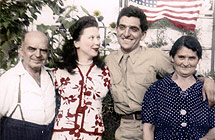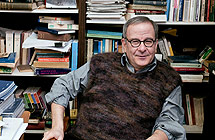By Patrick L. Kennedy
Jack Russell Weinstein says that society no longer condemns its philosophers to drink hemlock; it just sequesters them in universities.
But by taking to the airwaves, Weinstein (GRS'96, '98) is breaking down the wall that obscures the work of academic philosophers. This is his mission as host of Why? Philosophical Discussions About Everyday Life, on North Dakota's Prairie Public Radio.
Guests on the live, call-in show have included Nobel Prize–winning economist Amartya Sen and influential feminist Carol Gilligan. Topics have included the morality of universal health care and the philosophy of hunting.
An estimated 12,000 listeners across North Dakota and environs tune in for every monthly episode, while more have downloaded the podcast from whyradioshow.org. "We've gotten emailed questions from Iran, Canada, Scotland, Pakistan, Israel, and all over Europe," Weinstein says. Closer to home, fans have turned out in force for lively town hall–style broadcasts.
"I never expected this level of success and involvement," says the New York City native, who spent time after college busking in Vienna. "Not only has the general public embraced [the program], but so have professional philosophers."

Weinstein is a professional. He directs the Institute for Philosophy in Public Life at the University of North Dakota in Grand Forks, where he is a professor of philosophy. Through the radio show, fellowships, a popular film series, and other efforts, Weinstein explains, "The IPPL's explicit purpose is to bridge the gap between academic and amateur philosophers—people who dabble, who do it without credentials—and to bring both approaches into a common conversation."
That conversation may be the cure for today's rampant anti-intellectualism, says Weinstein.
"Philosophy is the study of the human place in the world. It's the way we relate to reality." You don't have to be an academic to ask yourself questions such as "What kind of father do I want to be? What kind of person do I want to be? What kind of neighbor do I want to be?
"Obviously, there are questions about government," adds Weinstein, who as an undergrad at SUNY-Plattsburgh was an activist for public education access. "Who do you want to vote for? Who best represents you? To what extent do you have a responsibility to care for someone you're not connected to? That's one of the fundamental questions of the human experience."
Weinstein invites people to explore such questions in a thoughtful, informed manner by exposing them to the research of career thinkers, in a format suited to dialogue.
"Philosophy is a conversational discipline," says Weinstein. A ska DJ while at Plattsburgh, he adds, "And radio does dialogue much better than television. If we were doing a television show, we'd have to have graphics, special effects, lasers, cute animation—all these things to attract the viewer's eye, which distract from the idea."
Why? turns on many more ordinary folks to philosophy than a worthy but relatively obscure journal article would. "When Charles Griswold [CAS professor and former chair of philosophy] was nice enough to be one of our first guests, a lot of people wrote in asking, 'How do I find his book [Forgiveness: A Philosophical Exploration]? Can I get it at a regular Barnes & Noble, or do you have to be a professor to get it?'"
Griswold was Weinstein's advisor at BU. "He's been a tremendous advocate and mentor for me since the day I walked into the University Professors Program," Weinstein says. "I wouldn't be half as successful if he hadn't taken an active interest in my postgraduation life."
At a time when the humanities struggle for respect, Weinstein makes a compelling case for the value of his field.

"First of all, you can get a job with philosophy," he says, pointing out that philosophy majors score the highest on the LSAT, for example. "If you go into a job interview and say, 'I'm a philosopher,' employers won't be interested. But if you talk about being able to see both sides of an issue, being able to describe complicated ideas to people who wouldn't otherwise understand them, to defend any position, to take a bunch of different ideas and put them into one coherent thought, to use your imagination intellectually, to be able to write well—these are skills that businesses are starving for.
"At the same time," he adds, "not everything about education ought to be based on getting a job. You work for eight hours a day. What do you do with the other 16 hours? Don't you want to be able to understand beautiful art, delve into interesting literature, think deep thoughts, and ask questions about your place in the universe? Philosophy is a tremendously important discipline, because it makes your life better, more fulfilling. It brightens the colors."
Weinstein, who was promoted to full professor last year at the age of 40, has a book forthcoming from Yale University Press called Adam Smith's Pluralism: Rationality, Education, and the Moral Sentiments. "It's investigating notions of justice," he says, "and an alternative interpretation of Smith, rather than the libertarian, conservative understanding."
In the meantime, the devoted father and husband (his wife is an English professor "on the same campus, in the same building") continues to teach, bring philosophy fellows to UND for public lectures, and host packed screenings and discussions of movies ranging from Casblanca to Slap Shot. And of course, he continues to broadcast Why? at 5 p.m. Central Time on the second Sunday of every month. Furthermore, he hopes to bring the program to a national radio audience through syndication. And why not?
"North Dakota exports a philosophy show and The Thomas Jefferson Hour," Weinstein points out. "Cambridge, Massachusetts, exports Car Talk. Everything is backwards!" ■
Philosophically Speaking
It should come as no surprise that a graduate of Boston University's philosophy doctoral program is spearheading an exciting effort to boost the public profile of philosophy. The department is one of several at BU to earn high marks recently from the National Research Council for faculty research productivity and other criteria. "Charles Griswold's book Forgiveness: A Philosophical Exploration, published three years ago, continues to be the centerpiece of conferences across the globe," philosophy chair Daniel Dahlstrom told BU Today. He added that in 2009, Tian Yu Cao, CAS associate professor of philosophy, delivered the opening keynote address at the First International Symposium on Structural Realism and the Philosophy of Quantum Physics.
Philosophy, physics, psychology, and many other CAS/GRS programs have received high ratings from the National Research Council.




